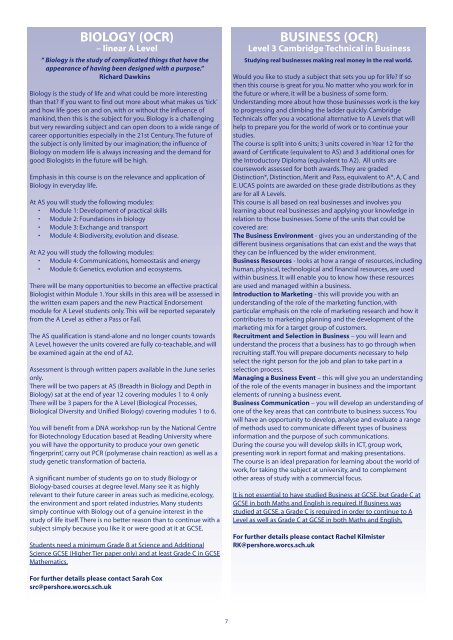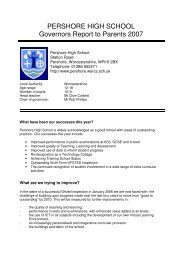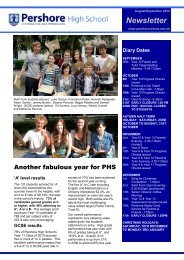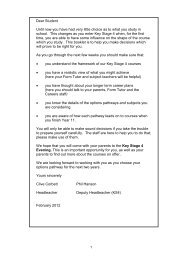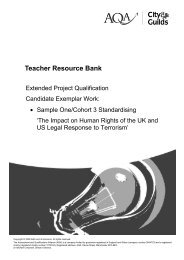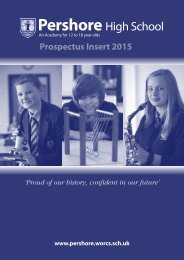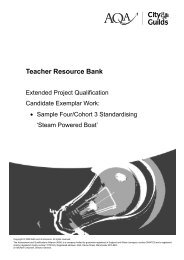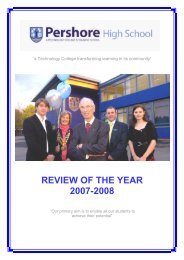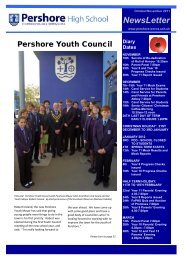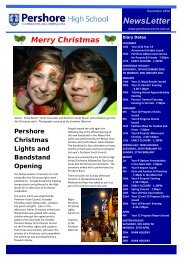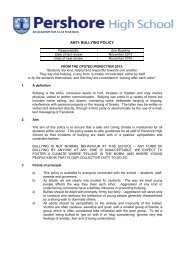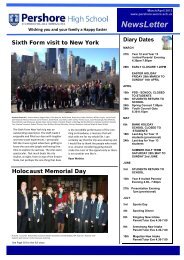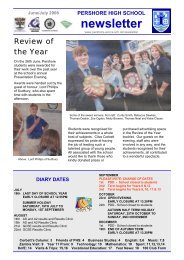Sixth Form Prospectus 2013 - Pershore High School
Sixth Form Prospectus 2013 - Pershore High School
Sixth Form Prospectus 2013 - Pershore High School
Create successful ePaper yourself
Turn your PDF publications into a flip-book with our unique Google optimized e-Paper software.
BIOLOGY (OCR)– linear A LevelBUSINESS (OCR)Level 3 Cambridge Technical in BusinessCHEMISTRY (OCR)– linear A LevelCOMPUTING (OCR)– linear A Level“ Biology is the study of complicated things that have theappearance of having been designed with a purpose.”Richard DawkinsBiology is the study of life and what could be more interestingthan that? If you want to find out more about what makes us ‘tick’and how life goes on and on, with or without the influence ofmankind, then this is the subject for you. Biology is a challengingbut very rewarding subject and can open doors to a wide range ofcareer opportunities especially in the 21st Century. The future ofthe subject is only limited by our imagination; the influence ofBiology on modern life is always increasing and the demand forgood Biologists in the future will be high.Emphasis in this course is on the relevance and application ofBiology in everyday life.At AS you will study the following modules:• Module 1: Development of practical skills• Module 2: Foundations in biology• Module 3: Exchange and transport• Module 4: Biodiversity, evolution and disease.At A2 you will study the following modules:• Module 4: Communications, homeostasis and energy• Module 6: Genetics, evolution and ecosystems.There will be many opportunities to become an effective practicalBiologist within Module 1. Your skills in this area will be assessed inthe written exam papers and the new Practical Endorsementmodule for A Level students only. This will be reported separatelyfrom the A Level as either a Pass or Fail.The AS qualification is stand-alone and no longer counts towardsA Level, however the units covered are fully co-teachable, and willbe examined again at the end of A2.Assessment is through written papers available in the June seriesonly.There will be two papers at AS (Breadth in Biology and Depth inBiology) sat at the end of year 12 covering modules 1 to 4 onlyThere will be 3 papers for the A Level (Biological Processes,Biological Diversity and Unified Biology) covering modules 1 to 6.You will benefit from a DNA workshop run by the National Centrefor Biotechnology Education based at Reading University whereyou will have the opportunity to produce your own genetic‘fingerprint’, carry out PCR (polymerase chain reaction) as well as astudy genetic transformation of bacteria.A significant number of students go on to study Biology orBiology-based courses at degree level. Many see it as highlyrelevant to their future career in areas such as medicine, ecology,the environment and sport related industries. Many studentssimply continue with Biology out of a genuine interest in thestudy of life itself. There is no better reason than to continue with asubject simply because you like it or were good at it at GCSE.Students need a minimum Grade B at Science and AdditionalScience GCSE (<strong>High</strong>er Tier paper only) and at least Grade C in GCSEMathematics.Studying real businesses making real money in the real world.Would you like to study a subject that sets you up for life? If sothen this course is great for you. No matter who you work for inthe future or where, it will be a business of some form.Understanding more about how those businesses work is the keyto progressing and climbing the ladder quickly. CambridgeTechnicals offer you a vocational alternative to A Levels that willhelp to prepare you for the world of work or to continue yourstudies.The course is split into 6 units; 3 units covered in Year 12 for theaward of Certificate (equivalent to AS) and 3 additional ones forthe Introductory Diploma (equivalent to A2). All units arecoursework assessed for both awards. They are gradedDistinction*, Distinction, Merit and Pass, equivalent to A*, A, C andE. UCAS points are awarded on these grade distributions as theyare for all A Levels.This course is all based on real businesses and involves youlearning about real businesses and applying your knowledge inrelation to those businesses. Some of the units that could becovered are:The Business Environment - gives you an understanding of thedifferent business organisations that can exist and the ways thatthey can be influenced by the wider environment.Business Resources - looks at how a range of resources, includinghuman, physical, technological and financial resources, are usedwithin business. It will enable you to know how these resourcesare used and managed within a business.Introduction to Marketing - this will provide you with anunderstanding of the role of the marketing function, withparticular emphasis on the role of marketing research and how itcontributes to marketing planning and the development of themarketing mix for a target group of customers.Recruitment and Selection in Business – you will learn andunderstand the process that a business has to go through whenrecruiting staff. You will prepare documents necessary to helpselect the right person for the job and plan to take part in aselection process.Managing a Business Event – this will give you an understandingof the role of the events manager in business and the importantelements of running a business event.Business Communication – you will develop an understanding ofone of the key areas that can contribute to business success. Youwill have an opportunity to develop, analyse and evaluate a rangeof methods used to communicate different types of businessinformation and the purpose of such communications.During the course you will develop skills in ICT, group work,presenting work in report format and making presentations.The course is an ideal preparation for learning about the world ofwork, for taking the subject at university, and to complementother areas of study with a commercial focus.It is not essential to have studied Business at GCSE, but Grade C atGCSE in both Maths and English is required. If Business wasstudied at GCSE, a Grade C is required in order to continue to ALevel as well as Grade C at GCSE in both Maths and English.For further details please contact Rachel KilmisterRK@pershore.worcs.sch.uk“All that glitters may not be gold, but at least it containsfree electrons.”John Desmond BaernalChemistry is a study of the elements and their compounds, andpractical work is a vital part of the course. With a qualification inChemistry you could go on to study other sciences or areas suchas Chemical Engineering, Materials Science or Biotechnology. It isessential for the medical field (the one A Level insisted upon formedicine.), Pharmacy and Environmental Science. Chemistry is alsoa well-respected subject in its own right and suitable for entry intoa number of professions.The topics that will be covered are:• Development of Practical Skills• Foundations in Chemistry• Periodic Table and Energy• Core Organic Chemistry• Physical Chemistry and Transition Elements• Organic Chemistry and AnalysisThe Assessment is as follows:• Two units at AS and 3 units at A Level are assessed throughwritten examination. In addition to this, at A Level there willbe a practical endorsement, which is mandatory but will notcount towards the A Level but is reported alongside it.• All written paper units are only available in the June series.The AS qualification is stand-alone and no longer counts towardsA Level, however the units covered are fully co-teachable, and willbe examined again at the end of A2.Without Chemistry, theworld would be a grey placeand there would be noman-made dyes to brightenthings up. WithoutChemistry there would befewer people as there wouldbe no medicines to curediseases. Without Chemistrythere would be no plastics,no metals, no paints, nobatteries, no deodorants, nodetergents, no soaps, notoothpaste.......get thepicture? It is a veryimportant subject.Study Chemistry and make the world a better place.“To think is to practise brain chemistry.”Deepak ChopraYou will require a minimum Grade B in both Science andAdditional Science GCSE (preferably <strong>High</strong>er Tier) and at leastGrade B in GCSE Mathematics.For further details please contact Alison Priceap@perhsore.worcs.sch.uk“Computing shows us the potential that we have in the virtualworld to solve problems in real life.”Jacob HolmesThis course is ideal for students who wish to go on to highereducation courses or employment where knowledge ofComputing would be beneficial. As well as working in thecomputing industry, one can study Computing and go on to acareer in medicine, law, business, politics or any type of science.In the First Year (AS) you will learn to program using avariety of languages, including Scratch and Python. You willbe examined on your ability to write short sections ofprogramming code as well as read through examples ofshort programming algorithms. To supplement practical skillsyou will learn the theory behind computer components, datastorage and the System Development Life Cycle.In the Second Year (A2) you will continue to developComputing theory and cover problem-solving, programming,operating systems, databases and networking as well ascompleting a practical project where you will workindependently to create a fully working computer system fora real-life end user of your choice. The two year Computingcourse is divided roughly into 80% examined content and20% project work, although you will spend a good deal ofyour time working in front of a PC to develop your skillspractically and then apply them to solve theoreticalproblems.There is a clear distinction between this specification and the GCEin Applied ICT specification as it has been written to avoid anyoverlap of subject content. As such, this A Level can be takenalongside Applied ICT and a few students choose to study bothsubjects each year.“You work with real end-users to solve real-life problems usingthe new programming skills learnt in the course.”George Stephens“Computing has given me a clear view of how computers workand where they are used. It has expanded my knowledge ofprogramming languages and how they function.”Simon Cartwright“I find this course challenging at times, although I thoroughlyenjoy it and am well supported throughout with lots of helpand advice.”Tom LaneYou do not need to have any prior knowledge of computing orprogramming although you are expected to have achieved at leasta Grade B in Mathematics.For further details please contact Hamza Aliha@pershore.worcs.sch.ukFor further details please contact Sarah Coxsrc@pershore.worcs.sch.uk7 8


